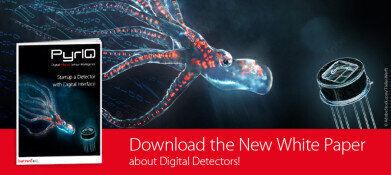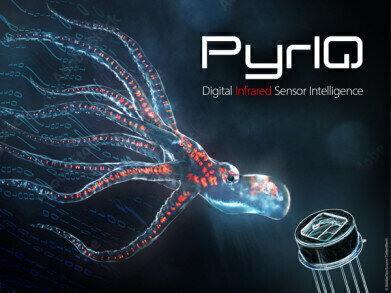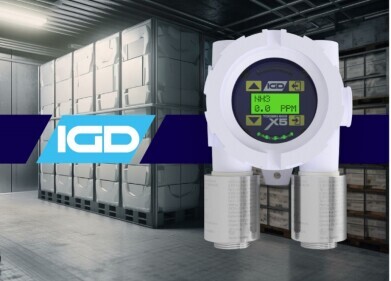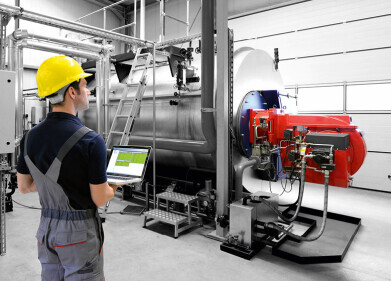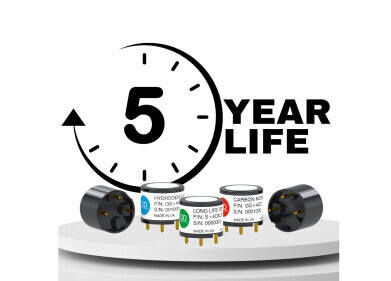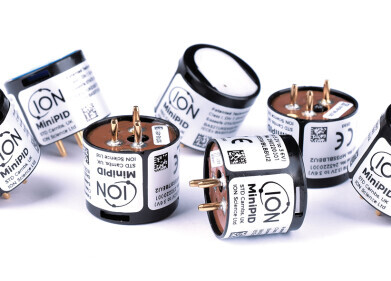Gas Detection
Digital Detectors for Easy System Integration
Sep 13 2022
The white paper from InfraTec is intended to show how to put the digital detector into operation with a basic microcontroller board like the Arduino Uno. You will also learn how to configure the detector and retrieve data.
The digital detectors PyrIQ convert the analogue signal, which can be filtered and amplified in several stages, directly into a digital signal with a 16-bit resolution. The entire signal processing is carried out by an ASIC (Application-Specific Integrated Circuit), whereby the analogue front-end acts like a classic transimpedance amplifier. Thus, users receive a digital measurement signal that can be read out via an I²C interface and immediately processed.
For high-precision measurement, especially in gas analysis, synchronisation of the emitter and detector clock is necessary. For the digital pyroelectric detectors, a clock input (pin) is available for this purpose, which is used to specify the system clock or the exact sample time. This allows a time signal with a highly precise sampling rate to be generated. Another special feature compared to analogue technology of our digital detector is the “Fast Recovery after Saturation”. This function detects overdriving due to a faulty operating condition – for example, due to extreme temperature fluctuations or mechanical influences – and automatically resets the analogue front-end.
Digital Pyroelectric Detectors – What are the Advantages?
Simple Integration
The integrated ASIC, which already contains an A/D converter, eliminates complex signal processing steps and the detector can be connected directly to the microcontroller without adjustments. This enables fast and simple system integration. The user is provided with the digital measured values with a sampling rate of up to 1 kHz, which can be read out and directly processed without additional hardware components via the I²C interface.
Improved Electromagnetic Compatibility
The entire signal conversion of the detector is spatially concentrated and shielded, resulting in a higher electromagnetic compatibility (EMC). The detector is more resistant to electromagnetic interference, so that EMC measures can be reduced by the user.
Variable Signal Processing
The most important features for characterising the performance of a pyroelectric detector are the frequency-dependent sensitivity, noise density and detectivity D*. Depending on the measurement system (measurement setup) and principle, there are different requirements for a well-dimensioned signal processing. The digital detector offers full flexibility in the configuration of the detector parameters, during development and also in later use. The sensitivity of the digital detector can be flexibly adjusted depending on the radiated power falling on the detector, in order to optimally utilise the subsequent input voltage range of the A/D converter. Feedback resistor Rf and feedback capacitance Cf can be set individually for each spectral channel of the detector. This allows the user to optimally adapt the performance of sensitivity and stability to the requirements of the application.
Digital Edition
Asian Environmental Technology 27.2 - April/May 2023
May 2023
In This Edition Business News - Celebrating The Life Of A Gas Measurement Industry Icon - A New Home For Gas Sensor Specialists - Envea Completes The Acquisition Of Hycontrol Ltd Environ...
View all digital editions
Events
Jul 02 2023 Albena, Bulgaria
Jul 04 2023 Cardiff, UK
Jul 05 2023 Johannesburg, South Africa
Jul 11 2023 Shanghai, China
Jul 11 2023 Lagos, Nigeria
